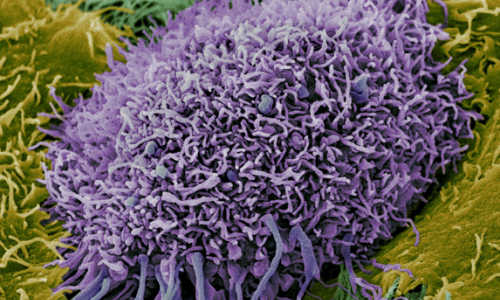US researchers have revealed the identity of molecules on the surface of cancer cells which allow the body’s immune system to identify and destroy them. The research could lead to a new generation of immunotherapies that are far more effective than those currently in use, that could target a range of cancers.
This discovery is big, big news for immunotherapy researchers – Dr Sergio Quezada, Cancer Research UK. “This is a huge breakthrough,” said Cancer Research UK’s Dr Sergio Quezada, who works at UCL in London and was not involved in the research.
“The researchers were looking for ‘signatures’ on the surface of cancer cells associated with response to current immunotherapies, but their findings go further than that. They’ve actually discovered molecular motifs that will inform the development of the next generation of therapies,” he added.
The researchers, led by a team at the Memorial Sloan Kettering Cancer Centre in New York, analysed cancer DNA from 64 melanoma patients who had been treated with an immunotherapy drug called ipilimumab, half of whom had responded to the drug.
Ipilimumab works by switching on the body’s immune system to attack their cancer, but – for unknown reasons – it only works effectively in a minority of patients.
“We’ve been using a drug that empirically was found to be quite effective, and yet we didn’t have a detailed understanding of how it was working in people,” said Memorial Sloan Kettering’s Dr Jedd Wolchok.
Having analysed the patients’ cancer DNA, the researchers used sophisticated software to look for genetic mutations in the cancer cells that could predict whether patients had, or hadn’t, responded to the drug.
In doing so, they uncovered a series of genetic mutations in some of the patients that caused the cancer cells to produce short stretches of protein molecules, called peptide antigens, that make cancerous cells visible to immune response.
Tantalisingly, it appears that these mutations cause the antigens to mimic small parts of proteins produced by bacteria and viruses, explaining why they are so effective at triggering the immune response – although the researchers say more research will be needed to confirm this.
The discovery is “big, big news” for immunotherapy researchers says Cancer Research UK’s Dr Quezada. “This is the first time we’ve had an idea of what the immune system actually ‘sees’ on a tumour. Until now, it’s been hot topic of debate,” he said.
More immediately, the findings could be used to predict which patients should be offered ipilimumab, which costs nearly £77,000 for a course of treatment.
“For the first time, it might be feasible to develop a reliable diagnostic test to help guide treatment decisions by predicting who will respond,” said Dr Timothy Chan, who lead the research team.
Story Source:
The above story is based on materials provided by University of Cambridge.





